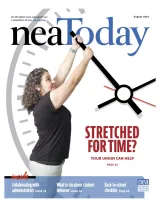Just before the 2023 – 2024 school year started, Illinois paraeducator Stephanie Lieurance received a curious text message.
“Hi Stephanie. This is Roland from Sunbelt. Are you in the market for a school paraprofessional position? I have an opening in your area. Please let me know if you’d like more details.”
Turns out Sunbelt is a staffing agency and, yes, she wanted more details.
Lieurance is already a para professional. She is also president of the Crystal Lake Association of Support Staff (CLASS), representing school employees in a district about an hour northwest of Chicago. She also heard from several colleagues who had received the same message. Where did these mystery texts come from?
Right away Lieurance contacted her Uniserv director and the Illinois Education Association. The state association discovered that Sunbelt had been retained by the district to fill vacant paraprofessional positions.
The district did this without notifying the union, let alone working with them to find other solutions to staffing shortages. “This really speaks to the severity of the educator shortage,”
Lieurance says. “This crisis has been looming for years, and ... the district waited until the last minute to bring in temporary help who aren’t committed to our students and our community.”
Unfair labor practices
Crystal Lake Community Unit School District 47 was paying the employment agency $65 an hour, while the temps were earning $30 to $35 an hour.
Lieurance, who has dedicated 20 years to the district as a learning resource paraprofessional, still makes less than $20 an hour, as do many of her veteran colleagues. The starting hourly salaries for permanent, fulltime paraeducators is a meager $16.14.
The district leaders’ decision to hire temps for more than double the hourly wage of some staff was an outrageous affront to these hardworking employees.
What’s more, hiring a firm to recruit temporary employees without bargaining first is a direct violation of the Illinois Educational Labor Relations Act (IELRA) and the Illinois School Code. In October 2023, CLASS filed an unfair labor practice charge with the IELRA.
“We have tried to work with the district multiple times on shortages and recruitment issues. However, District 47 continues to pay our paraprofessionals less than many of our neighboring districts,” Lieurance said at the time.
“We are constantly reminded by District 47 administrators that due to budgetary constraints, wage increases for new hires and current employees cannot be sustained,” she added. “They are now seeing the consequences of their own decisions.”
Instead of working with the union to offer attractive positions to fill shortages, the district took a shortcut that is now creating more shortages, as current staff leave out of frustration.
“We’ve had nine people quit,” Lieurance says.
Lack of respect
The new employees hired by the staffing agency started in fall 2023. They worked with general education students as well as students with special needs. Current staff members were tasked with training the temps to teach, change diapers, and manage behaviors.
“Our paraeducators are working two or three jobs to make ends meet, but are devoted to their work with students,” Lieurance says. “Having to train the new staff, who they knew were making so much more than they were, really took a toll on morale.”
CLASS members were shocked that administrators chose to hire expensive temps instead of investing in the people who put years into the district and love their jobs.
According to the union members, if the district increased wages and offered health insurance to attract new employees, they would need to apply the same benefits to current staff. So it was easier for them to contract out the positions.
“This is why people are leaving,” Lieurance says. “[District leaders] don’t see us as a priority.”
Big wins!
In May, the union and district finally reached an agreement, awarding CLASS members with lifechanging wins, including: A $2,000 payment at the end of the school year; an immediate raise of $1 more an hour; a 5 percent raise starting in July; and an extra paid professional development day, so they can train alongside the teachers they work with.
Lieurance admits she was hesitant at first about standing up. It was scary, and she feared retaliation.
“It was very daunting, but I’ve heard from other districts that are going through this,” she says. “I want the story of our small local to be told to bring awareness to what can happen. Our jobs are not hobbies. Our contracts are not suggestions. Our contracts are there to protect us.”
Find out more about ESP pay, job security, and the ESP Bill of Rights at nea.org/ESP.



